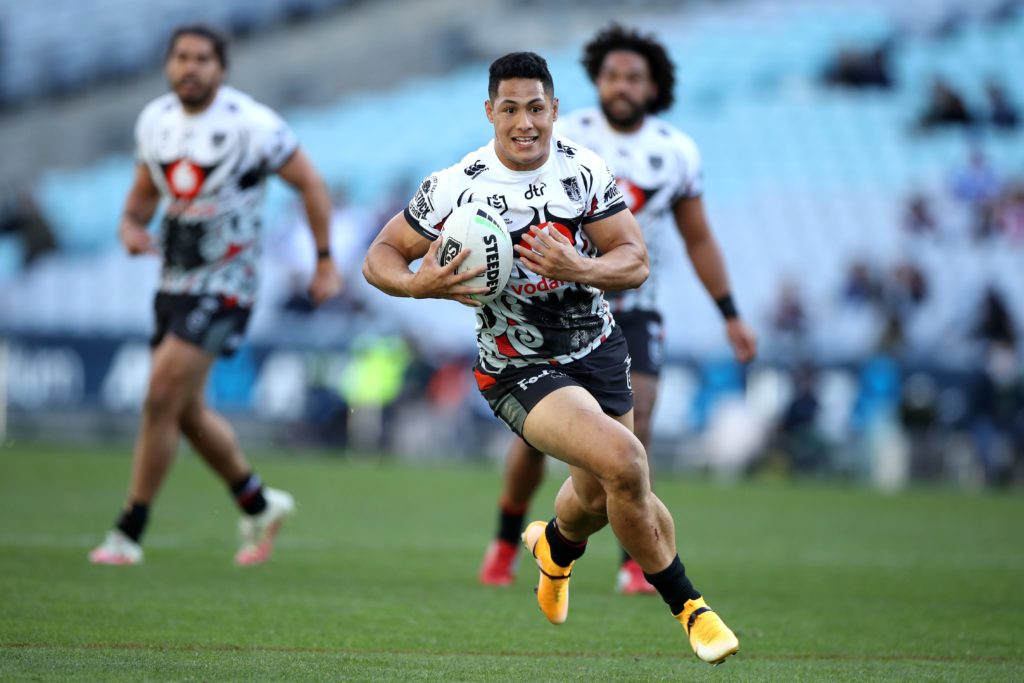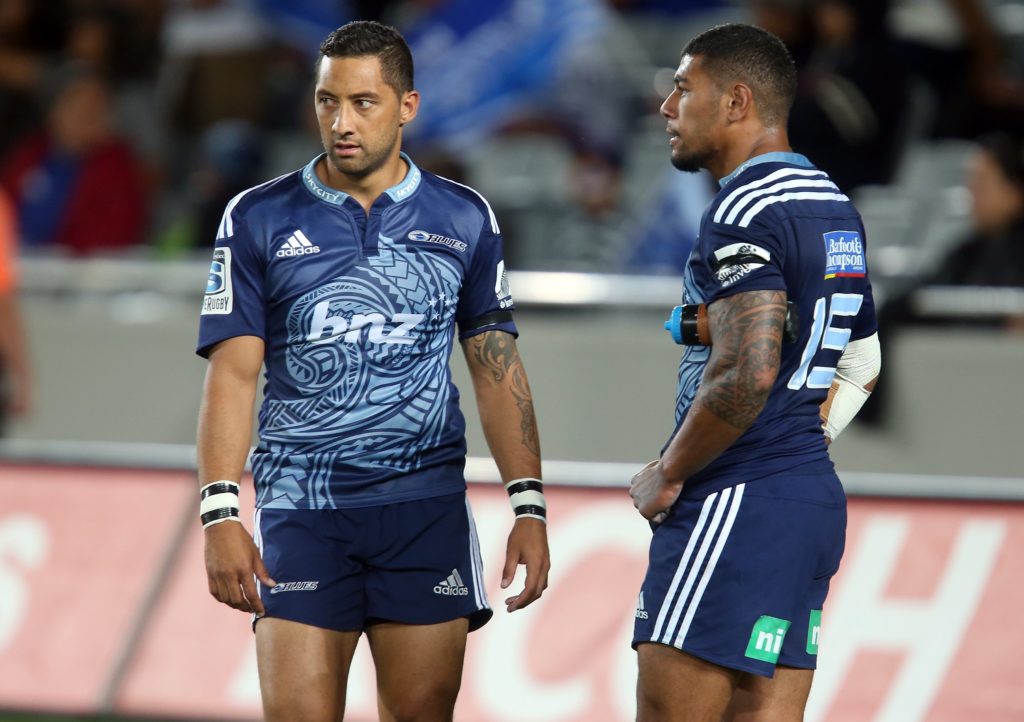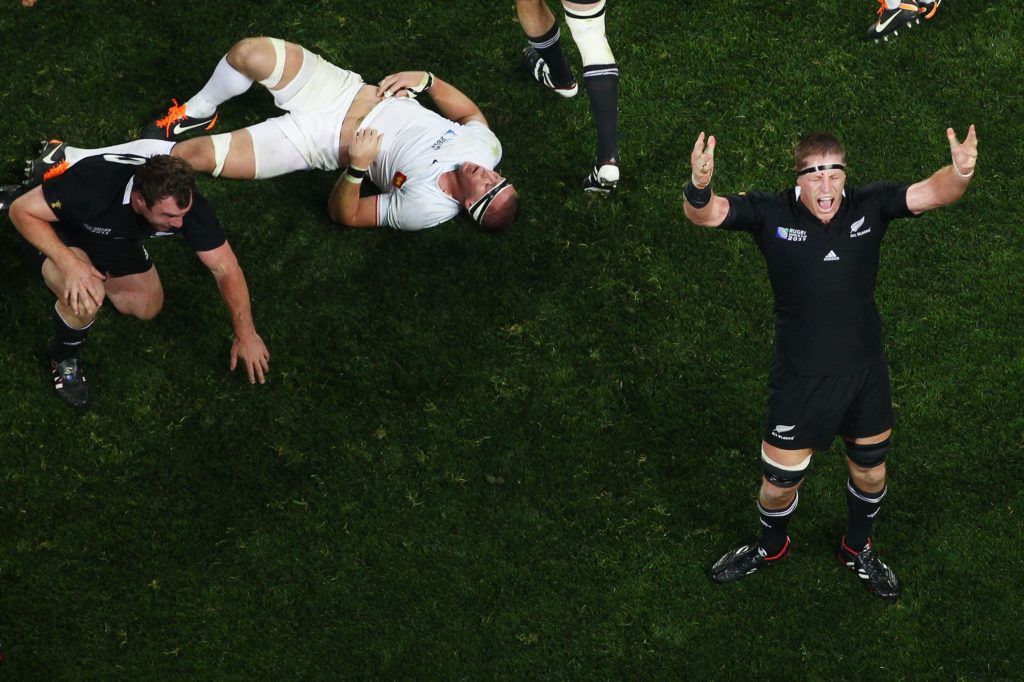Jason Robinson, Brad Thorn, Sonny Bill Williams – we’ve seen plenty of talented rugby league stars make the transition to rugby union.
Roger Tuivasa-Sheck, who played union throughout high school before making the switch to the 13-man code, has now thrown his hat in the ring and likely holds aspirations of representing the All Blacks at the 2023 World Cup.
But for every success story of a man dominating both forms of the game, history is riddled with players who have failed in their quests to jump from one code to the other, and Tuivasa-Sheck isn’t necessarily giving himself the best opportunity to place himself in the former category.
The 2018 Dally M Medal winner announced on Saturday that he would play one more season of NRL with the Warriors before making the transition to union in 2022.
If the World Cup really is a goal for Tuivasa-Sheck, then he’ll have just two seasons of professional rugby to gear himself up for playing in the sport’s premier event.
For every success story of a man dominating both forms of the game, history is riddled with players who have failed in their quests to jump from one code to the other.
That’s going to be a difficult task.
Look at the likes of Robinson, Thorn and Williams and their switches to union, and all three players had plenty of time to bed themselves into the game before the pressure was really piled on.
Robinson debuted for Sale at the beginning of the 2000-2001 season. By the time the 2003 World Cup rolled around, he had already amassed 23 tests for England and a half-century for the Sharks.
Thorn had a slightly more accelerated career, making the switch to union at the end of 2001 and representing Canterbury and the Crusaders before eventually earning his All Blacks debut in 2003.

Thorn, admittedly, was selected on New Zealand’s end of year tour in his first season playing union but turned the offer down – because he wasn’t yet sure if was committed to the sport. Ironically, after he finally accepted a spot in the All Blacks in 2003, he returned to league the following season.
Four years later, however, he returned to the 15-man game where he reinforced his position as one of the best code-hoppers of all-time.
Then there’s Williams – the man that so many love to hate. Arguably one of the greatest athletes of either code, Williams left the NRL in 2008 to link up with Toulon. He played two seasons with the club, earning 33 caps, then headed home to New Zealand where he represented Canterbury in the Mitre 10 Cup before receiving the national call-up.
Three exceptional players, three great careers – and all three gave themselves the time they needed to really make a good fist of their transition and not put undue pressure on themselves when they were already going to be in the spotlight.
If the World Cup really is a goal for Tuivasa-Sheck, then he’ll have just two seasons of professional rugby to gear himself up for playing in the sport’s premier event.
Contrast their code swaps to the likes of Sam Burgess’ or Benji Marshall’s.
Burgess was supposed to be England’s answer to Sonny Bill Williams and, having played his first ever game of rugby union in November 2014, was called into the national side’s training squad for the home World Cup in August 2015.
England, of course, were bundled out of the tournament in the pool stages, and Burgess was unsurprisingly not the superstar that the English public had been yearning for.
Burgess simply wasn’t ready to play international rugby when he received the call-up and might have eventually proven himself as a cross-code superstar if he’d been given the time to adjust to the nuances of the 15-man game.
Despite initially signing a three-year contract with Bath, Burgess returned to rugby league following that ill-fated World Cup.
Marshall, on the other hand, didn’t even last a season with the Blues after making the switch to union in 2014.

“I’ve got to take into account all my options but the opportunity to maybe one day play for the All Blacks is a pretty big motivator for me,” Marshall said in the lead up to signing with the Blues.
“Obviously I’m pretty nervous about that but at the same time excited at the prospect of having the opportunity.”
He played just six games for the Auckland franchise, however, before calling it quits, with then-coach John Kirwan suggesting the acclimatisation process was slower than Marshall had hoped.
“I sat down with Benji and said I wouldn’t be able to pick him in the 23 this week and felt that he needed to take a step backwards to come forwards, playing some club rugby and for the Blues development team to work on his game,” he said.
“I asked him honestly if he felt rugby was the game for him and his response was that he felt like a league player playing rugby union and that things weren’t happening as fast as he would have liked so we both decided it was probably best for him to return to playing league.”
“Everything I’ve learned in league I’ve had to throw out of the window and start again, it’s like going back to school and learning your two-times table all over again.
Benji Marshall
From holding aspirations of playing for the All Blacks to giving up on the dream within the space of a year – it was a sharp learning curve for Marshall that the switch to union shouldn’t be treated lightly, and something that any aspiring code-hopper should consider.
Unlike Burgess, Marshall wasn’t entirely new to union when he first made the switch. Until he had turned 15, Marshall had never played league at all.
Tuivasa-Sheck also won’t enter the code without any background in the sport, having represented the Blues Under-18 development side as well as the New Zealand Secondary Schools team in 2011. But by the time that he suits up for whichever side brings him on board in 2022, it will have been 11 years since he last played union.
Marshall’s move to playing professional rugby union came 12 years after he last played the sport at high school, and he was fairly open in admitting that it was a completely different ballgame to what he was expecting.
“I thought it wouldn’t have been [that foreign playing union] and, to be honest, when I made the switch, I thought it might have been a little bit easier than what it is but it’s been so much different,” he said.
“Everything I’ve learned in league I’ve had to throw out of the window and start again, it’s like going back to school and learning your two-times table all over again.”

Marshall may have found things a little bit easier if he’d committed to playing at fullback instead of flyhalf, but even the roles of outside backs are considerably different between the two codes.
Matt Duffie played five campaigns with the Melbourne Storm on the wing at and fullback before signing with the Blues ahead of the 2016 season of Super Rugby.
Duffie, like Marshall and Tuivasa-Sheck, played union at high school and regularly featured in the Saint Kentigern College first XV – which is how he picked up his NRL contract in the first place.
Despite being away from union for just eight years before joining the Blues, Duffie’s first season with the team was exceptionally challenging, with the convert named by one media outlet as “one of the six worst signings in Blues history”.
“I’m not saying that I clocked rugby league in any way, but the game’s a lot more simplified [compared to union],” Duffie told The XV. “It comes down to very high percentage plays, and all that sort of stuff.
“It was a hectic transition for me and I think the first year probably showed. I’m actually really proud that I stuck with it because there’s a lot of league players over the years that made the switch but haven’t necessarily hung around. Your first year is so hard. That second year was just way better, and then the third year’s better, and the fourth year’s better. You just start to understand the game a lot more.”
I”m not saying that I clocked rugby league in any way, but the game’s a lot more simplified [compared to union]. It comes down to very high percentage plays, and all that sort of stuff.
Matt Duffie
Duffie also acknowledged that heading back to the lower levels of the game made a huge contribution to his more successful second season with the Blues and eventual call-up to the All Blacks.
“I thought provincial rugby and club rugby were both great for me,” he said. “Club rugby was one of the best things for me. After my debut for Blues, I went back and played club rugby for a lot of that year, and that was great. It was exactly what I needed.
“It would have been great to see if Benji had stuck with it for another year. I think with his instinctual play, he would have been great, but there was just not enough time. Even Sammy Burgess doing that World Cup. How can you learn the game in that short amount of time, and you’re playing international footy? It’s just ridiculous.”
Duffie, however, has no doubts that Tuivasa-Sheck has all the abilities, character and nous needed to excel in union.
If Tuivasa-Sheck is to have any success in union then perhaps the smart option would be to cast aside any hopes of making France 2023, lest he end up disappointed.
“There’ve been people saying that I’m going to the All Blacks but that’s a bit disrespectful for a brand like the All Blacks,” he said. “You don’t just walk into the All Blacks.”
Tuivasa-Sheck is right, of course, and representing the All Blacks can no doubt be something that he should be working towards – but there’s plenty to tick off in the meantime.
The undeniably talented fullback should treat the first two years of his return to the 15-man code as an apprenticeship, simply trying to play as much rugby as possible. His focus should be, first and foremost, on getting involved in the club game and committing to playing in the Mitre 10 Cup where he can hone his trade before even considering taking a swing at the big leagues.
Otherwise, another of rugby league’s greatest players could find themselves going down in the record books as just another failed cross-code athlete.



Comments
Join free and tell us what you really think!
Sign up for free